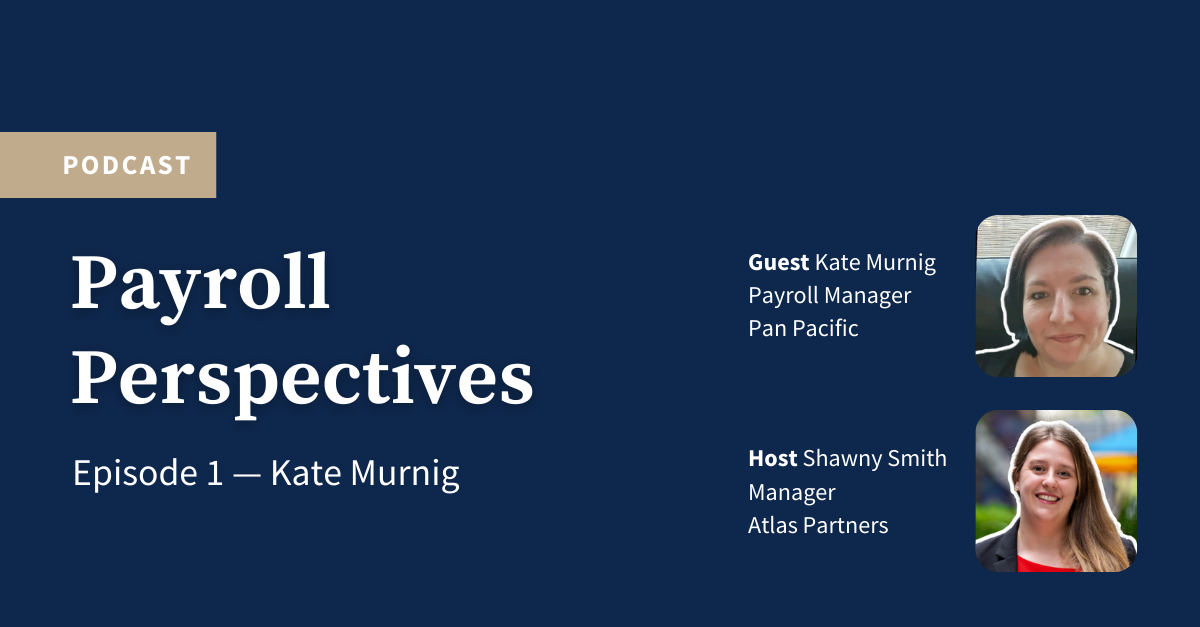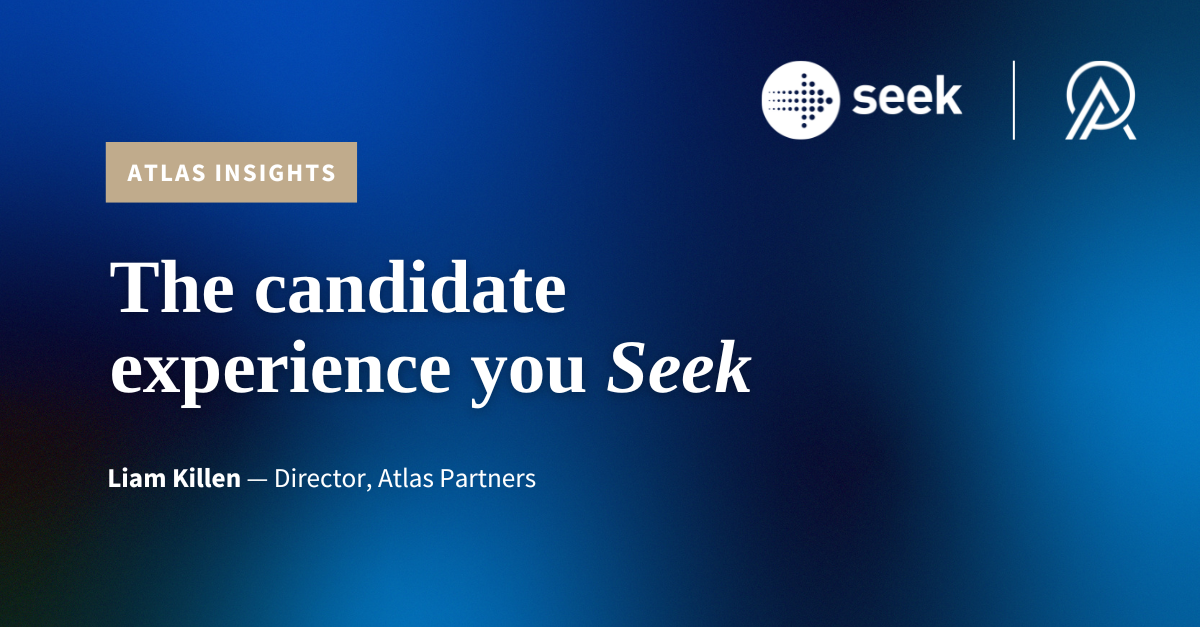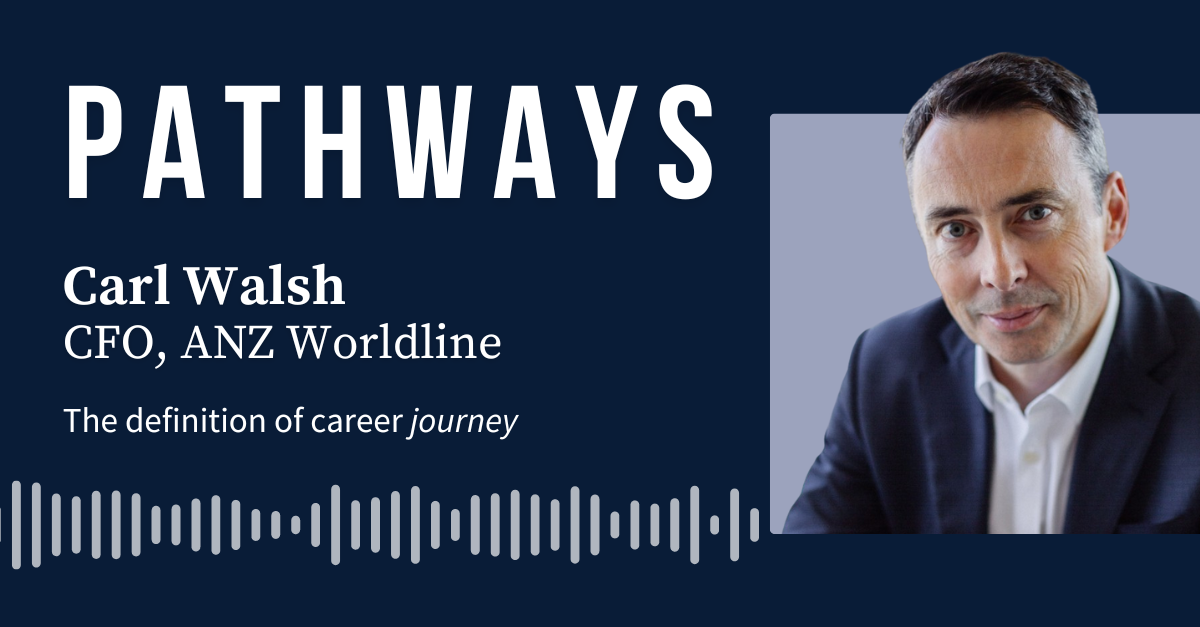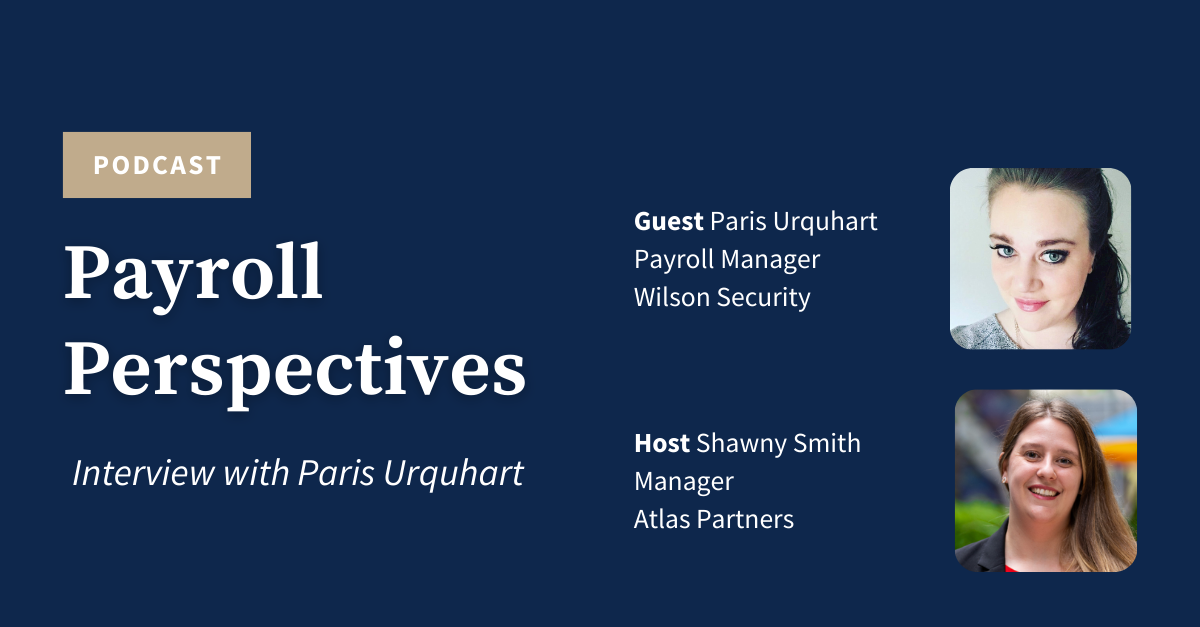Payroll Perspectives — Episode 1, Kate Murnig
Kate Murnig, Payroll Manager with hotel branch Pan Pacific Group has over 10 years experience in payroll across different levels and various industries including Government, Recruitment, Aged Care, Transport, Logistics, Manufacturing, and Hospitality. Passionate about the industry and where it is headed, Kate sat down with Shawny Smith of Atlas Partners to share her insight into what is takes to succeed as a payroll expert, the biggest changes she’s seen in her time, and how to combat burnout.
Listen
Transcript
S: Hi Kate, how are you going?
K: Good morning, Shawny. I’m good. Thank you. How are you?
S: Yeah, very well. I might start with some introductions to get us going, for anyone that doesn’t know. I am Shawny Smith from Atlas Partners. So I’m a recruitment consultant that specialises in the area of payroll and transactional finance. Kate, would you do a quick introduction for us?
K: Certainly. Kate May, I work with a group called Pan Pacific Group, we are a hotel branch. I’m the payroll manager there and I’ve been in the payroll industry for give or take about 11 years.
S: Perfect. Look, today we’re actually kicking off our Payroll Perspective series. Look, it’s something that we really want to be able to add value to the payroll market and for those also who might be decision makers and seniors within finance and HR, that also can relate to maybe learn something from this series as well. So we’re going to start off with a few questions just get to know Kate a little bit more and her journey in payroll.
So, the first question is an easy one. We’re going to start off with how you actually got into payroll?
K: I got into payroll purely by accident on the suggestion of a colleague. I started my work life in administration. Didn’t really know what I wanted to be when I grew up, so everyone needs a receptionist. A company I was working for, I made a friend who was a payroll officer. She commented on my ability to keep track of times and good relationship building skills being very process and ops driven and made the suggestion at the time if I ever wanted to change out of admin, that payroll would be a good choice for me.
A couple of years later, I was a bit sick of admin and made the decision to give it a try. I thought I’ll give it five years. If I’m going to be a success, I’ll know in the first 12 months if I don’t like it, well then it’s just a trial. Best decision I ever made in my life. For something that was just purely on a whim and purely by accident, it’s caters so much to every facet of my personality. I didn’t lose any of the skill set that I had in admin that I had worked hard to develop. People building, sorry, people relationship building, being able to talk on the phone, being able to handle any number of inquiries and handle it politely and diplomatically. It’s something, payroll is a very interesting in-between of human resources and finance.
That’s really what appealed to me, it appealed that I could deal with numbers, it was nice and simplistic and very bad and driven but I wasn’t losing the skill set that I already had. For me, it was the perfect move. Been there ever since.
S: That’s so awesome to hear. Again, this is my first time hearing all this, doing this on the fly today. No, honestly, it’s surprising to me how many people fall into payroll and actually I suppose we’re kind of at that point now where that’s actually changing a little bit and people are actually doing this on purpose.
K: Yeah, which is exciting. It’s an industry that is very much growing and becoming an industry or a department of itself. Payroll from time to time has been sort of a subsection of other human resources or finance. It has not actually been a department or a known ability on its own and there’s so many courses that are now becoming available to do it as a qualification. It’s very exciting to see where the industry is going.
S: No, I totally agree with you there. It’s something that years ago when I first started specialising in payroll recruitment, there wasn’t many, if any at all, qualifications and now we have APA and TAPS, that sort of help and have created some courses there and even universities now doing some degrees. It’s a really exciting time to be in payroll.
Definitely a topic for us to talk about at some point is regarding that where should payroll sit in that HR finance? When will it become its own kind of siloed function where they’re not reporting to either? It’s a very interesting question that we definitely want to touch on at some point.
Moving on to question two. This question stemmed from, I suppose, the amount of exposure payroll has been getting in the news and I suppose people have learned a lot more about payroll than they have in the last few years. But I suppose what do you wish people knew about the payroll industry that would help you and the team?
K: It’s not nearly as simple as we make it look. There are so many facets of the payroll function that are reliant not just on you being able to do your job well but on marrying up with all the other departments and then understanding that they need to do their part you need to do yours and it’s a team effort. It’s not just payroll doing their part, predominantly we are doing our part and that’s what we’re paid to do. We’re paid to pay everybody and to be as accurate as we can. In doing that we need to rely on the other departments, the other heads, our direct boss having our back.
So if there’s time sheets or if there’s questions on things that you need to ask during your process, so during the two or three days that you’re doing your processing, just then being aware that at any moment we may need to clarify something with you and if we can’t clarify that and we can’t clear that question up then it sort of delays the process a little bit. So it’s a very time sensitive sort of job. You rely on other people doing their part so it’s pretty much like anything if you can just work together and people can understand your perspective and you understand theirs. It’s something that I say to my heads of departments all the time. I understand you’re busy. I know you’ve got your job to do but so do I. Let’s work together rather than against each other because until I get what I need I will keep nagging you. I understand you’re busy but I need to get on with things too.
So yeah, unfortunately that can lead to so many problems where you have incomplete data or there’s questions between your time and attendance system and your payroll system. That’s sort of opening the gauntlet for things to be questioned and as soon as things get questioned that’s where errors are found and that’s where you may end up in a position you don’t want to be so be it you’re in the news for miss paying an employee or an employee is constantly coming to you with questions about their pay and it’s something that you’ve missed but there’s just so many things that can happen and it’s such a wide variety of problems that can arise just because of that extra five seconds or extra five minutes not taken to clarify what it is that you’re processing.
S: I really love what you said. Everyone wants to get paid, everyone wants to get paid correctly and the payroll team job is to pay people correctly. They love it. I know you love it. That’s what keeps you going week to week. So I think it’s just that understanding that everyone wants to get it right and it’s not personal. It is very timely so I agree with everything that you said there.
K: That’s pretty much bang on the head that we don’t intentionally make errors. If anything payroll people, we are control freaks. We like to have everything perfect week after week. It’s not something that we want to be happening where you’re coming to us and saying I think this is wrong or whatever the case might be but we can only go with what we are told. So if there’s a time that’s missing or a shift that’s missing or something that hasn’t been loaded correctly we don’t have the authority or the ability to be assuming we have to go back and check that information and it’s very much a case of that’s where payroll is very finance driven that we have to cross all of our teas.all of our eyes make sure that everything is as picture perfect as we can get it.
S: Awesome. Well look I’ll move on to question three. I suppose what would your advice be to someone in a senior payroll position looking to step up into leadership?
K: Give it a try. It’s something that processing payroll is once you know what you’re doing and you’ve been doing it for a few years you feel invincible. You know that you can do it. You know that how you’re interpreting time checks, how you’re processing all of that sort of thing. It’s very comfortable because you’ve gotten so used to it. It’s very process driven.
As you move up through the hierarchy of the payroll department you start to take on more ownership of the process so you can have a say in how the process is driven or if there’s ways that you can see that things are going to improve or interacting with the team taking on responsibility of say training them or being that go to person or the in between person between the payroll manager and the rest of the team. These are all more human relatable topics and if it’s something that you feel you want to do if it’s something that you want to try by all means try. It’s like anything in life. If you don’t try then you don’t know if you’re going to succeed.
If you’re open with your leader and they’re open to being a mentor then half your battle is one. I’ve been very very fortunate in the buses that I’ve had throughout. Specifically the last five years I’ve had some fantastic mentors who have encouraged me any time I put my hand up to try and learn something or said I’m not sure if I understand this correctly could we put aside a half an hour or an hour to go over it together. They’ve been more than happy to give me that time.
So I suppose the best thing to do is if you feel you want to do it put your hand up and ask to learn more. That’s going to show your leader that you are interested that you want to develop and also going to help you get out of that shell of being protected within the payroll team that a lot of us can become introverted within payroll. So moving up to a senior level if not team leader if not payroll manager you are going to start dealing with people more you have to have that backbone in place. You have to have the confidence to be able to speak on multiple platforms and multiple levels. That all starts with just putting your hand up and saying I want to know more I want to be better. How can I do that? I think that’s the best advice I can give. Just give it a try and see if you like it. If it’s something you can adopt into your role then it’s certainly going to lead to bigger and better things.
S: Honestly from my perspective when I’m looking at seniors those people that are on the cusp of leadership and we do have a role where they’re looking for that person to step up. The biggest thing is someone who has been proactive throughout their career asked to do more, learnt more, taken it on themselves to bring forth initiatives or process improvements. Really someone who’s willing to put their hand up and say hey I would love to do this. So I agree with everything that you said there.
Okay so next question. Number four I believe, what would you say are the top three skills that make a great payroll officer?
K: There’s so many things that can make a great payroll officer but there are three primary things that are probably things that are not teachable that are partly ingrained in a personality. Yeah, attention to detail and that understanding that you’re only as strong as your data. So if your data has no integrity the rest of the platform is going to change. So you need that really strong base and understanding that from the moment the employee on-boards that’s where it starts. Anything flowing from that will have an effect on how they’re paid, how their lever crews, everything like that.
That then flows into an analysis ability so if you see something wrong or if something doesn’t look quite right having the ability and the want to then review not just that person but potentially everyone else who’s set up like that and think okay well that person’s profile is wrong so they’re operating this way, it’s not necessarily right. Who else is affected, can we improve and is it something that is just isolated to this one person or is it something across the board and then also realizing that that potential set up problem is that something that was unknown to whoever is onboarding the payroll department or HR and if it is unknown this is an opportunity to improve. You don’t take it personally or you don’t accuse anybody of oh you’ve done this wrong that’s not what we’re about. It’s a chance to improve and say okay well how can we do it better moving forward.
So there are probably two things that are ingrained in a person, they’re not always teachable. You can but if someone has that inclination already it makes it so much easier and probably the third thing that I love to have an attainment is fire. If you’re having a normal payroll day and like I said it’s going to be busy on a Monday day, you don’t be hitting the ground money. If something happens, if say your platform drops or you’re out internet for the day or anything like that knowing that that’s going to have a flow and effect and you can rely on your teammates to have that fire in their belly to then push through and make sure that we still hit our targets, hit our marks, everything is done on time. That’s not an easily trainable or teachable skill and being that payroll is very time sensitive and we do have a limited window to do everything. Having that fire just makes it so much easier. Everything else in payroll can be teachable. How to use the programs, how to interpret the awards, how to make it like the data, that’s all teachable and if you’ve got a good leader then they’re more than happy to invest that in you. Those soft skills aren’t always as easily teachable. So if someone’s already got those skill sets as a leader, you’re halfway there.
S: Again, definitely agree with you. Years ago when I first started in payroll, most hiring managers were focused on systems experience and years of experience in payroll even for some sort of mid to junior level type roles. So I think it has been really amazing to see that shift in the last three to four years that they are more thinking, okay, what are these soft skills that they’re coming with? And they really succeed in this role. Urgency is definitely something that is really hard to teach someone. That sense of payroll is so important. Would you want to be paid late or wrong? Those are the kind of questions you need to be asking yourself. You don’t always get to leave on time. You don’t always get the luxury of, oh, I’m clocked out by. Payroll is definitely something where you need to get it right and pay people on time.
So we’re about to lead into the last question, a bit of a bigger question, I suppose. I just want to get from your perspective what you think has been the biggest change or challenge in payroll for the last two years?
K: I love questions like this because as you know, I geek out on the whole payroll industry. The biggest change I have personally seen the last two years, well, actually there’s probably two and I can’t really decide which one is more prevalent. And one is a reaction to the world that we were given in 2020 of the pandemic. We can now work remotely, which before was not a possibility for payroll. payroll is such a sensitive information role and something that you need to be accessible to the employees at all times.
That’s been a huge change to now see people working from home or working remotely or whatever situation that they need being able to travel overseas if they need to go visit family or something, but still being able to be online and available. That’s a huge progress for our field. It allows us to still be reachable, but it also allows us to have a little bit of downtime, which let’s face it, HR payroll, where I burn out area. So having that little bit of flexibility is a wonderful thing.
But personally, the thing that I’ve probably enjoyed the most, the last two years that’s changed has been how we are reporting to the ATO and the change of where the payroll information is stemming from. So up until 2019, we would each year at the end of the financial year receive a group certificate from our employer. That then changed. It’s now to the point where STP2, single touch payroll level two, was released in December of 2023, 22, sorry, a year ago. And how that information, that’s submitted to the ATO. Every time you do a payroll cycle, you are submitting that information layer upon layer upon layer, each cycle to the ATO. So they know exactly what we have processed in terms of what we pay our employees. That alleviates the need for us to be producing group certificates. It’s not an employer function anymore. It is an ATO function.
What that does in terms of the payroll department is it alleviates those needs where the ATO is coming to us and asking for historical employee information. It alleviates them having to ask for reports for child support payments. So being that it’s now been operational for five years, nearly five years. It’s going to reduce the amount of interruptions a payroll person has in their week. So all that admin stuff that you do after the pay cycle that you get to when you can. All of that is a fundamentally five, ten years. It’s not going to be a problem for us anymore because all of that data will be within the ATO. They won’t have to come looking to us for that information. And that is such an exciting thing.
I know a lot of people look at it as big brother watching, but in terms of a payroll professional, it’s alleviating so many things out of your already chaotic week that you don’t have to be worrying about. It’s an incredible function that the ATO have rolled out. So I can’t thank them enough for the development that they’ve done with that. And just the legislation that’s changed in terms of that. It is very exciting to see where it’s going to go the next five to ten years.
S: Honestly, I totally understand it’s been a huge undertaking and all the changes in shifts and things that we had to do during COVID has just sort of increased the amount that we needed to do in a short period of time. So it is really exciting, but I know exactly what you’re talking about regarding that burnout. It has been changed after change in payroll. It has been very much the same in HR. I totally get it. But look, I know I sort of said I was only going to ask you four or five questions, but there was another one because you mentioned burnout. I suppose do you have any advice for people on how you manage in payroll and that kind of burnout that comes with working in such a fast pay, as full as whole, constantly changing environment?
K: Magic 8-ball maybe. It’s something that I’m very passionate about teaching those coming up. Anyone that I have come into a team that I’m part of, even when I was only a payroll officer myself explaining to them the time sensitivity and that you’re not always going to be going home on time. So there is a lot of requirement. If you can go in with that knowledge knowing that there is a bit of pressure on you, you kind of expect it. I mean, anyone going into payroll knows that it’s a bit of pressure. And you either relish it or you don’t. But to reduce the case of burnout, it’s a case of communication. If you can feel yourself getting a bit rundown or if you feel like the pressure is getting a bit too much, voicing that to your supervisor or to the boss or whoever is leading the department and saying, look, we’ve had a really busy couple of months. I need a down day. I need to just bed home and just chill.
And it’s actually an interesting thing because a few years ago, what we all termed sick leave changed to what’s now called personal leave. Personally also covers two days of mental health days. Now mental health days, you don’t necessarily have to be sick with the flu, but it is a day where you just mentally, you need to tap out. You need to be at home. You just need to just disconnect from whatever you’re doing. And that’s now permissible within compliance and within legislation.
But probably the biggest thing is saying, for me personally, I’ve been a little sick this week. I’m home working today. I just needed the time to have some quiet, to be able to get through my emails, to be able to speak with you quietly without any interruptions. So being able to do that from home is a big thing. So having that flexibility, like we said, as a result of the pandemic, it’s a positive that’s come out of it. You can still be tapped into your work, but you don’t have to be as pressurised as what you would be visibly accessible in the office. But communication is key. If you can vocalise that to your leaders and alter your team mate and say, I just need a day or I need to leave early or whatever.
And having that relationship with your team is so important. You spend so much time with your work colleagues. You can see them more than your family. They’re going to understand more so than your family when your time is run a bit low and when you need to go and sort of recoup. Something I do with my team mate is at least once a month, we’ll just go and grab a coffee on a Friday afternoon. I’ll ask what’s going on in their life. They’ll ask what’s going on in mine. 15, 20 minutes, 30 minutes. No work discussed, no phones, no nothing. We go outside of the business. So it’s just a case to just take that breather.
S: That is so nice. And I definitely appreciate when I’m feeling run down or stick, but I suppose on that border line I can still get work done, especially when there’s urgent things going on. Being able to be at home, not travel, really saves you, I suppose, some energy that you can actually put into the work. So I appreciate being able to work from home in that regard as well. It’s actually a key thing now. And honestly burnout is also relatively common in the recruitment industry. It’s again up and down can be a bit volatile and you have to come and just go with the flow a little. But I do have to say that things get busy, you get stressed and then you stop doing the things that bring you joy. And I think just having those check in moments with yourself to be like, what have I done today to look after myself, to bring self care? Have I had enough water? Am I sleeping? Well, have I done any kind of exercise or movement? Talk to a friend.
K: Do I have something I’m looking forward to in the next six months?
S: And I think holidays are great, plan as many holidays as you can. It’s a wonderful thing to look forward to and to do in your downtime to look at all the amazing things you’re going to do next time you go away.
K: And obviously it doesn’t always have to be a grandiose holiday. I’ve got something I’m looking forward to next month. My parents are celebrating their 50th wedding anniversary, which huge achievement in today’s day and age. That’s just something I’m looking forward to. And I’ve got that pin pointed on my calendar. It’s been shared in the payroll calendar that I’m excited about it. So just any little thing that you can do, like you said, what’s brought me joy?
S: Honestly, during, during COVID, I learned that lesson. Every day I was like, what have I done to bring myself joy while I’m locked in this house?
Well, look, I think we’ll wrap up there. Thank you so much for your time. I really appreciate all of your insights and, yeah, what you’re able to share from a payroll perspective.





